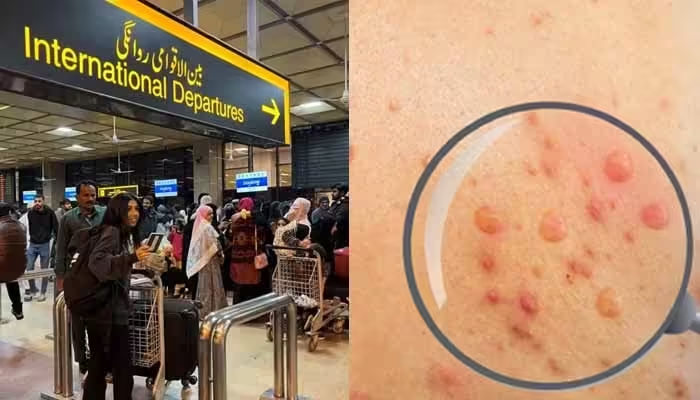In response to the ongoing concerns regarding the monkeypox virus, new comprehensive guidelines have been issued to enhance the preventive measures at airports across Pakistan. These guidelines are designed to ensure the safety of passengers, crew members, and airport staff by strictly implementing Standard Operating Procedures (SOPs) that focus on screening, isolation, and the overall management of travelers arriving in the country.
Implementation of SOPs by Civil Aviation
The Civil Aviation Authority (CAA) has been directed to enforce all SOPs related to flights and passenger management rigorously. The new guidelines emphasize that all airlines, their staff, and ground handling companies must comply with these regulations without exception. This means that every person involved in the operation of flights and the handling of passengers at airports is now required to adhere strictly to the protocols established to mitigate the risk of monkeypox transmission.
Screening and Isolation Measures at Airports
A key element of the new guidelines is the implementation of enhanced screening and isolation measures at all entry points, particularly at airports. The Border Health Services Department has been entrusted with the responsibility of carrying out these measures effectively. All passengers arriving in Pakistan will undergo thermal screening to detect any signs of fever or other symptoms associated with monkeypox.
In addition to passengers, screening of flight crews arriving from international destinations has also been made mandatory. This ensures that any potential cases of monkeypox among crew members are identified early and managed appropriately to prevent the spread of the virus.
Role of ASF and FIA in Security and Immigration
The guidelines outline specific roles for various agencies at the airport. The Airport Security Force (ASF) is tasked with providing security at the isolation areas set up within airports. These isolation areas are crucial for temporarily holding passengers who show symptoms of monkeypox until they can be safely transported to a medical facility.
The Federal Investigation Agency (FIA) Immigration is also required to play a significant role in the implementation of these guidelines. The FIA is mandated to provide detailed passenger information to the health authorities, enabling efficient tracking and monitoring of individuals who may be at risk of carrying the virus. Furthermore, the FIA is instructed not to issue on-arrival visas to foreign nationals unless they have been cleared by health authorities, ensuring that potentially infected individuals do not enter the country without proper health checks.
Coordination with Customs and Health Authorities
The new guidelines also establish a close coordination between customs officials and health authorities. Customs clearance of passengers’ luggage will now require approval from health officials, ensuring that any goods that could pose a health risk are thoroughly inspected. Moreover, customs and health officials are empowered to jointly inspect imported goods, adding another layer of protection against the introduction of the monkeypox virus into Pakistan through international trade.
Disinfection of Aircraft and Distribution of Masks
To further enhance the safety of air travel, the guidelines mandate the disinfection of all aircraft arriving in Pakistan. This is a critical step in preventing the virus from spreading via contaminated surfaces within the aircraft. Additionally, all airlines are required to provide face masks to their passengers during the flight. This measure not only helps reduce the potential spread of the virus but also reassures passengers that their health and safety are being taken seriously.
Public Awareness and Preparedness
In light of these developments, Prime Minister Shehbaz Sharif has also directed that an awareness campaign be launched to educate the public about the monkeypox virus and the importance of following health guidelines. The campaign aims to inform citizens about the symptoms of monkeypox, the modes of transmission, and the steps they can take to protect themselves and others.
The new guidelines issued for airports in Pakistan reflect a robust and coordinated effort to prevent the spread of monkeypox. By enforcing strict SOPs, enhancing screening and isolation measures, and ensuring the cooperation of various agencies, the government aims to protect the health of the public and prevent the virus from gaining a foothold in the country. These proactive measures, combined with public awareness campaigns, are essential in combating the potential threat posed by monkeypox and maintaining the safety of air travel in Pakistan.



